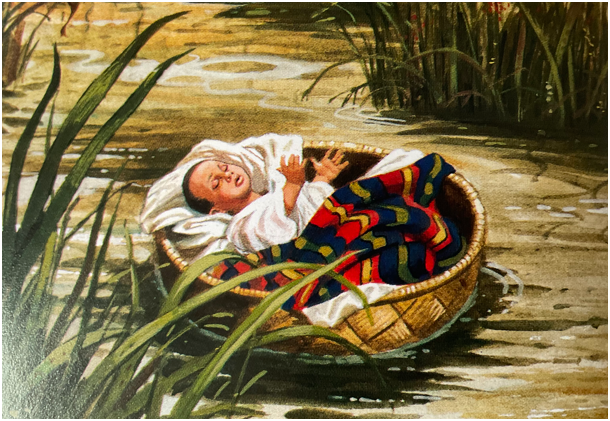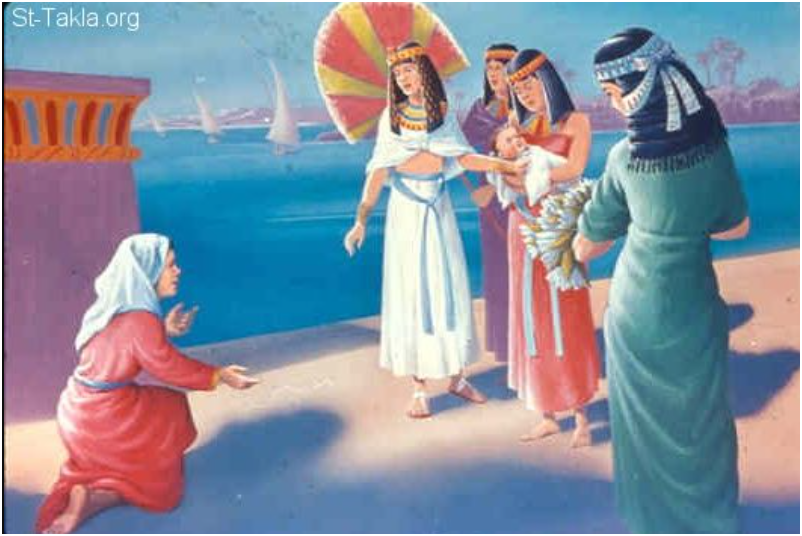AN UNPREACHED SERMON (186)

I wonder how many of you spent your first few months in a Moses basket? Maybe there is one in your family lovingly looked after and handed down through the generations. You would have to go back to the 14th century BC and the reign of Ramses II, the Egyptian pharaoh, to find the original one.
Ramses saw the Hebrews as a threat to his security, which is why he set up an elaborate extermination policy. But he underestimated an ordinary Hebrew mother who was determined her son would live and a God with whom she was very much in tune.
This is divine post-natal care. Rather than allow her baby to be drowned, Jochabed hid Moses for three months. “Butwhen she could not hide him any longer, she took a basket made of reeds and covered it with tar to make it watertight. She put the baby in it and then placed it in the tall grasses at the edge of the river” (Exodus 2:3). Nowadays Moses would have been abandoned in a car park, a telephone kiosk or a bus station; or worse, aborted before drawing his first breath.
After being placed in the Nile, his big sister Miriam “stood at a distance to see what would happen to him” (Exo 2:4). If we take up a similar position among the bulrushes on the opposite bank it will amaze us what we see.
A MOTHER’S LOVE.
The incident is a timeless reminder that there is something in this world more powerful than the edict of a tyrant king – the protecting love of a mother’s heart. Jochabed’s love for baby Moses is seen in her careful planning of the whole operation.
Sometimes all we can do for our children is commend them to God’s care. A child has a great start in life when launched out with a mother’s prayers. Many centuries later, St Augustine would a say about his mother Monica, “I would not be Your child, O God, had you not given me such a mother”. And even for those who never had so godly a mother as Jochabed, there is the truth, “When my father and mother forsake me, the Lord will take me up” (Psalm 27:10), forever enshrined in the hymn:
“Can a woman’s tender care
Cease towards the child she bare?
Yes, she may forgetful be,
Yet will I remember thee”.
A SISTER’S WIT.
Miriam obviously saw her role as being more than a babysitter. It turns out that by guarding the baby she was guaranteeing the destiny of God’s people. In the course of doing her duty as a loving sister, she came away with the cleverest of questions. “Shall I go and call a Hebrew woman to act as a wet-nurse?” (Exo 2:7). Jochabed would go down in history as the mother paid a wage to bring up her own son.And of course, many years later when the adult Moses and his sister Miriam had crossed over the Red Sea they sang a celebratory duet on the shore. (Exo 15:1-21). And years after that again, the prophet Micah could say to the whole nation, “I sent Moses, Aaron and Miriam to lead you” (Micah 6:4).
A BABY’S TEARS.
So often in world history, major events have hung on slender threads, but none so slender as a baby’s tears. God floated His army of deliverance into Egypt on the tears that ran down a baby’s cheeks. Eventually this “girnin’ wean” rose to political prominence and shook the land of the Pharaohs to its foundations. The Hebrew nation and Jewish people were saved and the course of world history was forever changed.
Dr A B Simpson wisely said, “The Lord is often present in our lives in small things that we do not dream possess any significance”.
A DAUGHTER’S CURIOSITY.
Ramses II had nearly 60 daughters, but this is the one that matters most. Moses “was crying and she felt sorry for him” (Exo 2:5, 6). Once her maternal instincts were aroused Ramses own daughter triggered a marvellous succession of events. Her concerned curiosity made it possible for Moses to be brought up and trained cross-culturally. He had access to all the literature, wisdom, philosophy and science of Egypt, but at the same time remained fully aware of his Hebrew identity and heritage.
We regularly need to pray for children dedicated to the Lord that where the influence of this world threatens the values of the next, that they will do as Moses did when he reached an age to make his own decisions. “He refused to be called the son of Pharaoh’s daughter” (Hebrews 11:24-26).
A TYRANT’S DOWNFALL.
It is impossible to read the whole story of Moses, not just this incident, and not realise that behind a domestic drama there stands God in complete control.
Towards the end of the 19th century the embalmed body of Ramses II was discovered. On the walls of his excavated tombhis brave deeds were all recorded. The archaeologists inferred from the marks on the skull that he had been killed by an axe blow. The greatest king in the world at that time, but God was greater. “God looks on the people of the earth as nothing; angels in heaven and people on earth are under His control. No one can oppose His will or question what He does” (Daniel 4:35).
Pharaoh planned to destroy the Hebrews, but God had bigger plans. And the sting in the tale is that God’s plan to deliver was derived from Pharoah’s plan to destroy. “It was faith that made the parents of Moses hide him for three months after he was born. They saw that he was a beautiful child, and they were not afraid to disobey the king’s order” (Heb 11:23). As Thomas Watson the Puritan preacher declared, “Satan is on a long rope, and he’ll hang himself yet”.
Crouching down in the bulrushes, we can see all this with the eyes of faith:
• A mother’s love
• A sister’s wit
• A daughter’s curiosity
• A tyrant’s downfall
God used a baby’s tears to answer a mother’s prayers, save an entire nation and thereby preserve and guarantee the line of Christ, God certainly moves in mysterious ways, often using ordinary people and apparently insignificant events to achieve His purposes. He often achieves gigantic ends with very small tools; in this case a baby whimpering among the bulrushes.



Comments